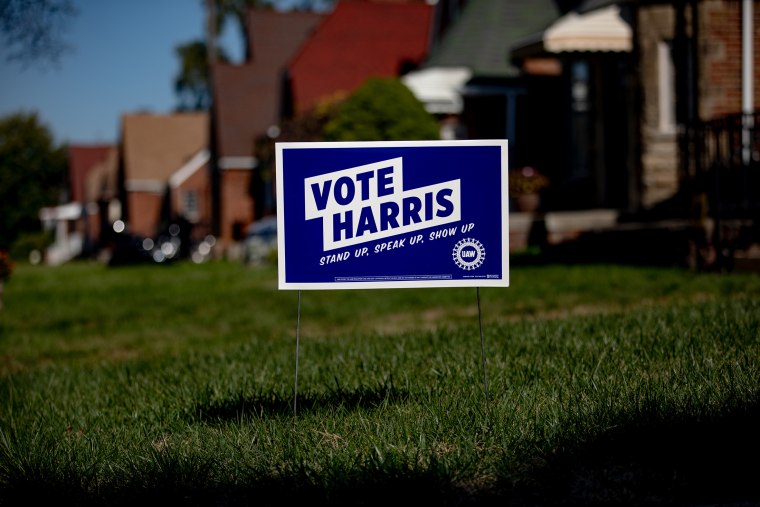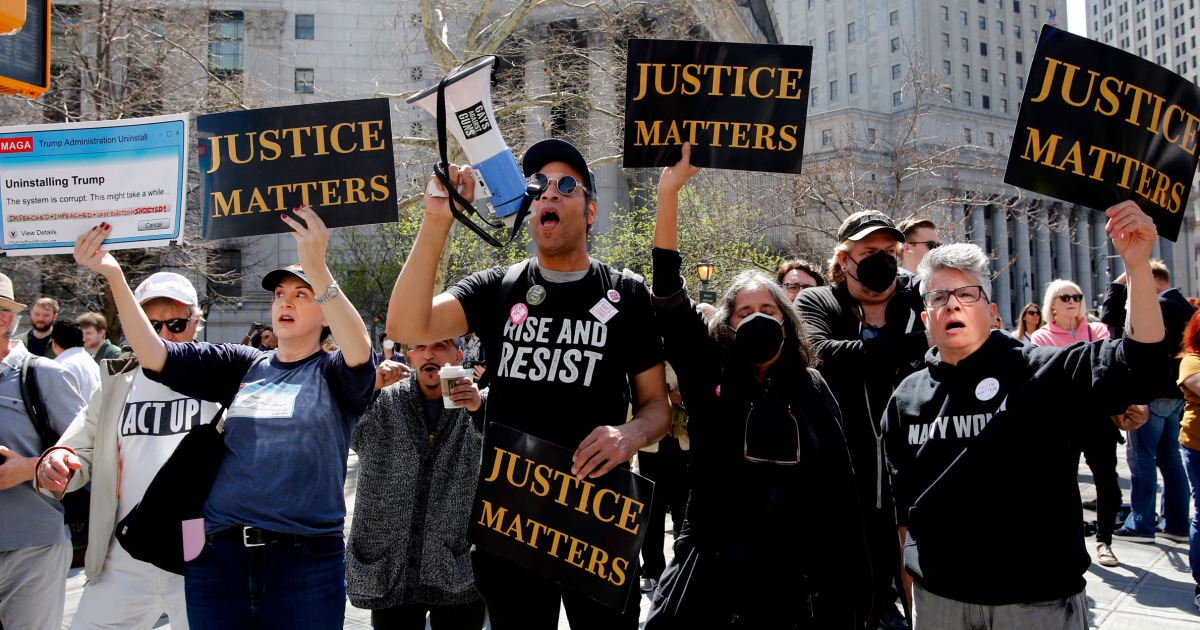Local governments are uniquely able to combat growing national polarization, according to a new study out Wednesday from the nonprofit research organization CivicPulse and the Carnegie Corporation of New York.
The study, which features quantitative and qualitative conclusions following interviews with more than 1,400 local elected policymakers and local civil service leaders, found that 87% of those surveyed said political polarization negatively affects the country “a great deal” or “a lot.”
Meanwhile, just 31% of local officials said that political polarization negatively impacts their local communities to that extent.
“Political polarization, which is dominating the media at the national level, really is not dominating life at the local level at all,” Louise Richardson, president of the Carnegie Corporation of New York, a philanthropic fund supporting research and education, told NBC News about the report.
She added that it’s “very reassuring” that communities “irrespective of whether they were broadly liberal, conservative or mixed … were getting on with day-to-day work of forging compromises, forging policy to address the day-to-day needs of their constituents.”
Smaller communities are less polarized
Dividing responses by population size, the survey found that local officials from smaller communities see fewer negative effects from polarization than those from larger communities.
While 46% of officials from communities with 50,000 or more residents said their community is negatively affected “a lot” or “a great deal” by polarization, just 28% of local officials from communities with 1,000 to 10,000 residents said the same.
One of those local officials is Jeff Sorensen, township supervisor for Cooper Charter Township in Michigan, a community of about 11,000. Sorensen, a Republican, told NBC News that officials in the community must run as Democrats, Republicans or independents, but once they take office “those hats are off, and we serve the people that live in our districts.”

“It’s really quite a beautiful situation here,” he added.
The local officials interviewed for the study attributed the dearth of negative polarization in their communities to several factors, including that local government officials and their community members spend more time together, which allows for opportunities to connect over shared values and interests outside of politics.
“The more one interacts with folks with divergent views, the more one realizes we are all human beings with more in common than not,” one survey respondent, an elected official from California, told the study’s authors. “Hard to scream at someone and wave a flag (or gun) in their face when you just sat next to them at a Lion’s Club function.”
Respondents also noted that solutions to local issues, such as potholes, sewer problems and busted traffic lights, don’t often fall on clear partisan lines.
“A political affiliation and its underlying philosophy doesn’t play a meaningful role” in addressing community needs related to things like infrastructure, one respondent, an elected official from a small municipality in New Jersey, wrote in response to the survey questions.
Sorensen added that sometimes local issues have to be resolved within a matter of days or hours, and that arguing across party lines slows down the process.
For example, he recalled a situation in 2018 in which local officials learned that a local source of drinking water was contaminated with per- and polyfluoroalkyl substances, or PFAS chemicals, at almost three times the legal limit.
Officials across city lines “got together and had the City of Parchment’s water system drained within 72 hours, and had the City of Kalamazoo, and our constituents from the City of Parchment and Cooper, drinking clean water within that period of time.”
Just 12 hours into the emergency, officials had thousands of cases of water being passed out to residents with help from city and county officials, Sorensen added.
“Everybody working together and not worrying about who was paying for a thing,” he said. “That is something you look at as local cooperation, and that is something that myself and others in township government have strived to build.”
The study found that political polarization affected the relationships of community leaders less than it did their constituents, with 36% of respondents saying community members were impacted “a lot” or “a great deal,” compared to just 23% saying the same about relationships among elected officials.
Emily Holmes, vice chair of the board of supervisors for North Strabane Township in Pennsylvania, noted to NBC News that election season can be “exhausting” in the key battleground state, but “I notice that more as a resident of where I live, and not so much as a local elected.”
“I think a lot of it has to do with the dynamics amongst board members and how they interact with each other,” Holmes, a Democrat, added. “Are there divisive members on your board that bring the national into the local politics?”
She said that she hasn’t experienced a negative shift in partisanship on her board, but “I do believe it’s a delicate situation, and could shift at any moment.”
Heightened tension during election season
The study found that polarization does have a profound impact on local governments around elections because they are usually those in charge of collecting and counting ballots, hiring poll workers and actually administering federal and statewide elections.
“You end up in this kind of bizarre situation where, even in communities where there’s only 5,000 people, if you’re feeling anxieties about the federal election, your channel for expressing those anxieties is perhaps to go and say something hostile to, you know, your city council member,” Nathan Lee, founder and managing director of CivicPulse, told NBC News.
He added that sometimes local officials bear the brunt of people’s frustrations about federal elections because they are more accessible to community members than federal or even state-level elected officials.
Local officials are “the front lines for people who are looking to express their concerns, and sometimes their concerns are expressed respectfully, and, unfortunately, a lot of times they’re not,” Lee said.
The study also found that the national political parties’ increasing focus on local issues has destabilized the relative political peace that existed in local communities.
Debates on LGBTQ programming and the books in schools and public libraries are just one example of national issues that have become hyperlocalized, survey respondents wrote.
Lee pointed to the fact that these types of issues, which deal with schools, libraries and local zoning, are “in the jurisdiction of local government” and naturally fall to the local level.
“Even though they’re a national conversation … by default, these topics often are going to fall in the hands of the governing board of your local community,” he added.
Local news deserts
The shift from a reliance on local news outlets to social media as a source of information in recent years is leading to misinformation and more division in communities, the study also found.
Holmes said that in her township, local issues aren’t immune.
“Development is a big topic that is divisive in my community, and there are online groups that are created around certain developments that are proposed.” The online groups have spread even with several local news outlets still operating in the community, she added, noting that the divisiveness online is much worse than in person.
“People feel much more free to say something online than they feel to say to you in person, or even sometimes in an email,” she said.
Still, the authors of the report broadly saw points of optimism emerge from the survey, despite the pressures that local government leaders are facing from the forces of polarization at the national level.
“People see local government as a group of human beings that they also run into in the gym or the grocery store,” Lee said. “It makes local government officials more relatable to their constituents and their residents, and I think that’s a good thing for trust.”

Leave a Reply